show/hide words to know
The Arctic Needs Your Help
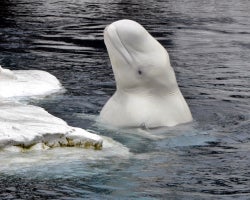
Many animals are in danger due to warming Arctic, including beluga whales. Image by Hafiz Issadeen via Flickr.
Living in the Arctic, walrus know first hand how climate change is affecting this part of the world. Walrus and other species can benefit if we all learn more about how we can help protect the Arctic.
The main threats to the Arctic are coming from other places. People and companies do things all over the world that release greenhouse gas emissions. This results in warming that melts Arctic ice and threatens all life there.
How You Can Help the Arctic
Individual action by you, your family, and friends can help slow climate change and protect the Arctic. Each of our actions have implications that reach further than just our backyards.
Changing what you eat is important. Did you know that one of the fastest ways to reduce your daily carbon footprint is to not eat beef? The care and feeding of cattle, as well as their belching of methane, results in lots of greenhouse gas emissions.
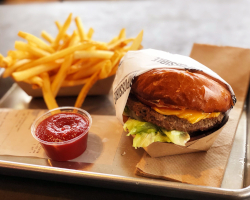
Avoiding beef is easier than ever. This delicious-looking hamburger is made from a totally vegetarian patty. Sarah Stierch via Flickr.
Other actions that you can take, when possible, is to switch to transit that makes less pollution like trains, buses, and bikes, rather than driving or flying. On average, driving half as much throughout the year will save about three square meters, or 32 square feet, of the walrus’s icy home.
If you want to learn more about the climate impact of your own life, check out the Ecological Footprint Calculator Quiz(link is external).
Think Before You Need To Recycle
It is important to reduce and reuse what we buy. Think before you buy something new. Do you really need it? Would a used version work just as well? Recycling is important too, but it’s last in the saying of ‘reduce, reuse and recycle.’ This is because it’s the least effective of the three.
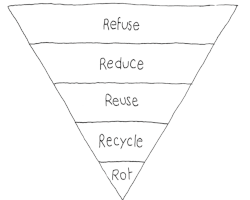
Some people add "Refuse" and "Rot" to the "Reduce, Reuse, Recycle" slogan. You can refuse single-use plastics and compost (rot) biodegradable food waste. Image by Bea Johnson.
Lots of products that are recycled in the U.S. don’t actually get made into new products. Instead, they end up in landfills in countries far away from the consumer who recycled it. Recycling doesn’t do as much as we would all like to think. The most effective action is to reduce how much you buy in the first place!
Help The Arctic With Your Choices And Your Vote
When lots of people make small changes, for example in what we buy and do, it can lead to big impacts. It also tells companies and industries that we want them to help address climate change and save the Arctic too. When you spend money at a certain company you are telling people that you support what that company is doing to their employees, and to nature. When you support companies that do good for the environment, you show people what you care about. When you can, use your vote to impact policy changes that help reduce climate change and promote sustainability.
Keep Learning About the Arctic
Another great thing to do is to keep learning and spread the word about what you have learned – the more people that can make a change, the bigger the impact! The best way to know if the choices you’re making help slow global warming is to learn as much as you can about the causes and effects of climate change. You can watch videos about what's happening in the Arctic because of climate change. You can play games, like EcoChains: Arctic Futures, to learn more about the food webs and food chains in the Arctic. And don’t forget to tell your teachers you want more activities focused on climate change in school.
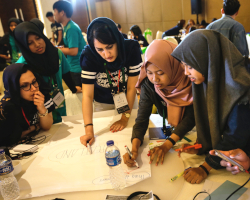
Even though young people can't vote yet, they can help work toward a better future. Here, students have an important conversation about ways they can protect the environment. Image by CIFOR via Flickr.
Surprisingly, one of the reasons why actions haven’t happened sooner to reduce climate change is that people don’t talk about it. Some people who do talk about climate change take the position that it is always happening anyway. However, the changes have been so big in the past few decades that we can say that the world is changing faster than ever. So, share what you’ve learned with other people.
Talk with your family and your friends about changes in the Arctic, and what we can do to reduce greenhouse gas emissions. They might have different opinions than you, and that’s ok! If they’re unsure about climate change, sit down and do some learning together.
When we talk to each other about threats to the environment, we can help each other create better habits to protect the Arctic and all who live there. Right now these threats from climate change are easy to see in the Arctic, but someday soon we’ll see them everywhere.
Get Others to Care About the Arctic
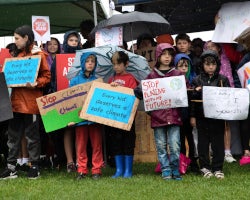
Student protests are becoming more common. Here, students are protesting for better climate change policies. Image by Olia Balabina.
It is also important to try to make changes happen on a much larger scale. If you are passionate about slowing climate change, you can get involved with advocacy groups. These groups talk to politicians, business owners, and the public about how to make good changes. People in the government have access to money and other resources that they can use to make bigger changes. They can give money to agencies that focus on protecting nature. They can also write laws that make companies treat the environment better. People in local government can make changes in cities, like spending money to make mass transit easier to use.
You can help them decide what changes to make by letting them know how you feel. Your government representatives need to know what you care about. Call, write letters, and as soon as you’re able to, use your awesome power to vote!
This section of Ask A Biologist is based upon work supported by the National Science Foundation under Grant No. 1928235.
Any opinions, findings, and conclusions or recommendations expressed in this material are those of the author(s) and do not necessarily reflect the views of the National Science Foundation.
Additional Images from Wikimedia Commons. Image of students speaking with politicians from the Youth climate roundtable via Flickr.
View Citation
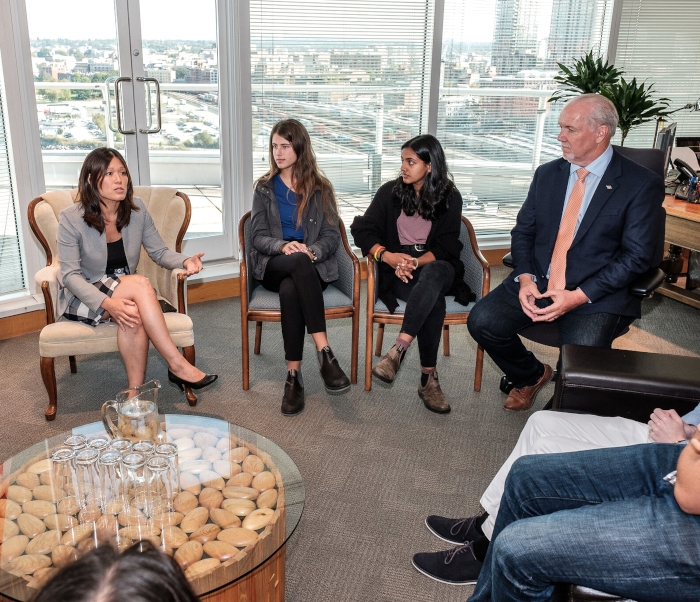
Even if you can't vote yet, it doesn't mean you shouldn't act. Anyone can help promote or create laws that protect the Arctic, no matter their age. Here, students talk with politicians about climate change.
Be Part of
Ask A Biologist
By volunteering, or simply sending us feedback on the site. Scientists, teachers, writers, illustrators, and translators are all important to the program. If you are interested in helping with the website we have a Volunteers page to get the process started.







